With their happy personalities and boundless enthusiasm, Golden Retrievers are popular family members all over the world. Their playful nature and unwavering loyalty make them popular pets, but like any breed, there are health risks. To ensure your Golden Retriever lives a long, happy, healthy life, preventative care and a thorough understanding of their special needs are essential. It’s more than just cuddling and playing; it’s about being a responsible parent who is prepared to address any health issues that may arise. It’s vital to keep your Golden Retriever healthy. These dogs are built for activity and thrive on a regimen that includes exercise, mental stimulation, and a balanced diet. Neglecting their well-being can lead to a cascade of problems that will not only affect your physical health, but your emotional well-being as well. From joint problems to genetics, understanding common health conditions is the first step to optimal treatment. This guide aims to give you the knowledge you need to keep your furry friend in tip-top shape so you can enjoy every moment of your retirement.
In this blog, we cover the most Essential Health Tips for Golden Retrievers and common health issues in Golden Retrievers, including hip and elbow dysplasia, heart disease, cancer, and skin allergies. We discuss practical strategies for prevention, early detection, and effective treatment. We also provide practical tips for Golden Retriever health. Whether you’re an experienced Golden Retriever owner or have just brought home a new puppy, this dog health guide will give you the tools and information you need to raise a healthy Golden Retriever. From nutrition and exercise to grooming and regular veterinary checkups, we offer a holistic approach to your dog’s well-being. Let’s start this journey together and ensure your Golden Retriever has a bright and fulfilling life.
Contents
- 1 Daily Health Care for Your Golden Retriever
- 2 Protecting Your Golden Retriever:
- 3 Sparkling Smiles and Healthy Hounds:
- 4 Invisible Threats:
- 5 Keep hydrated:
- 6 Listen to the Whispers: Recognize the early signs of illness in your Golden Retriever.
- 6.1 Common Signs of Illness in Golden Retrievers:
- 6.2 When to Call the Vet for Specific Symptoms
- 6.3 Prevention: The Best Defense Against Serious Health Problems
- 6.4 Beyond Physical Health: Look After Your Golden Retriever’s Mental and Emotional Well-Being
- 6.5 The Importance of Mental Stimulation for Golden Retrievers
- 6.6 Activities to Help Your Dog Feel Happy and Stress-Free
- 6.7 Recognizing Signs of Anxiety or Depression in Dogs
- 7 Be Prepared: First Aid Supplies for Every Golden Retriever Owner
- 7.1 Essential Items in a Dog First Aid Kit
- 7.1.1 Sterile gauze pads and pads:
- 7.1.2 Adhesive tape:
- 7.1.3 Wet wipes or antiseptic solution (vet approved):
- 7.1.4 Blunt-tipped scissors:
- 7.1.5 Tweezers:
- 7.1.6 Digital rectal thermometer and lubricant:
- 7.1.7 Petroleum jelly:
- 7.1.8 Eye wash solution (vet-approved):
- 7.1.9 Hydrogen peroxide (3% solution):
- 7.1.10 Activated charcoal:
- 7.1.11 Muzzle:
- 7.1.12 Emergency blanket:
- 7.2 Basic First Aid for Minor Injuries
- 7.3 When to Call the Vet
- 7.1 Essential Items in a Dog First Aid Kit
- 8 Creating a Safe Home Environment for Your Golden Retriever
- 9 Adventure Awaits: Travel Safely and Comfortably with Your Golden Retriever
- 10 Conclusion:
Daily Health Care for Your Golden Retriever
Just as humans benefit from structure and routine, consistent daily care is essential to the health and happiness of your Golden Retriever. Not only does this predictable structure help regulate your physical needs, but it also contributes significantly to your emotional security and overall well-being. A proper daily routine will help you monitor your dog’s behavior and identify any deviations that may indicate potential health problems early on. Consider this the foundation for a long and healthy life for your furry friend.
Daily Health Care for Your Golden Retriever
Here is a helpful checklist of important items to include in your Golden Retriever’s daily health care routine:
Proper Meal Plan:
Consistency in mealtimes is crucial. Feeding your Golden Retriever at the same time each day will help regulate his metabolism and digestion. Choose a high-quality food that is appropriate for your dog’s age, activity level, and specific nutritional needs. Measure out the food according to the package instructions to prevent your cat from overeating, which can lead to binge eating and weight gain. It is also important to provide them with fresh, clean water at mealtimes.

Exercise and Mental Stimulation:
Golden Retrievers are an energetic breed that need regular exercise to stay healthy and avoid boredom. Daily walks, playtime in the garden, or even a fun game of fetch are important for maintaining cardiovascular health, muscle tone, and joint mobility. Intellectual stimulation is also important. Keeping their minds stimulated with puzzles, educational activities, or interactive games will prevent destructive behavior and keep them mentally fit and happy. Make sure to balance exercise and mental stimulation throughout the day.
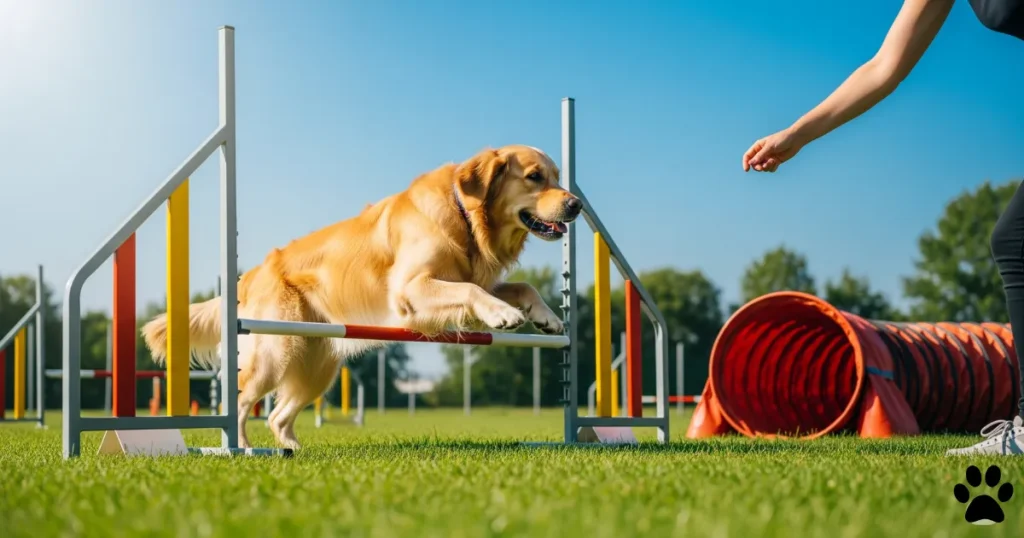
Grooming Products
Regular Grooming not only ensures that your Golden Retriever always looks good, but is also crucial to your health. Brushing your dog’s coat daily, or at least several times a day, helps remove loose hair, prevent tangles and mats, and distributes natural oils to the skin, which promotes a healthy coat. Regularly checking and cleaning the ears is essential to prevent ear infections, a common problem in floppy-eared breeds. Nails should be trimmed every few weeks to avoid discomfort and possible damage. Incorporating these grooming measures into your daily routine will help your children get used to the process, and you will be able to spot skin problems or abnormalities early.
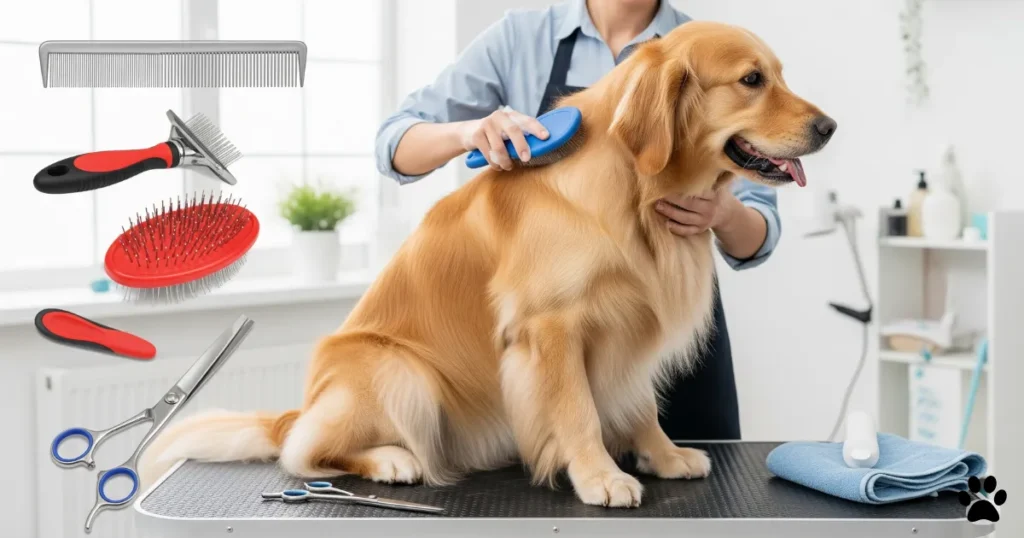
Protecting Your Golden Retriever:
The Importance of Vaccinations and Preventatives Just as we protect ourselves and our loved ones with vaccinations and regular checkups, the same proactive approach is necessary to protect the health of your Golden Retriever. Vaccinations and preventatives are the foundation of a long and healthy life for your four-legged friend. They protect you from potentially serious and even fatal diseases. By understanding the importance of these actions and adhering to the recommended schedule, you are actively contributing to their well-being and ensuring that they can enjoy a full life with you.
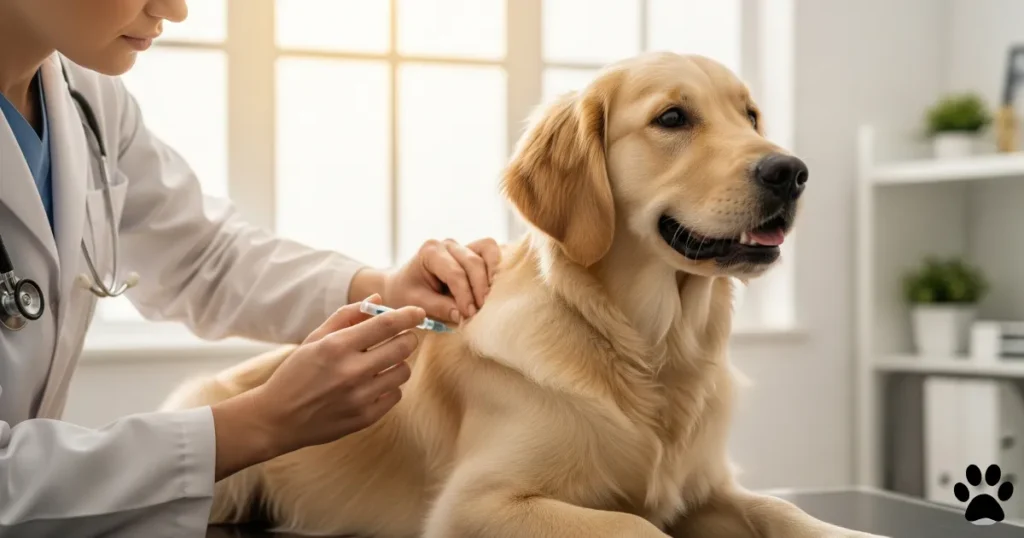
The Crucial Role of Vaccines in Disease Prevention
Vaccines work by introducing a weakened or inactive form of a virus or bacteria into your dog’s immune system. This allows your body to produce antibodies. These are specialized proteins that can recognize and fight the real disease when exposed to it. Vaccinations are very effective in preventing the spread of infectious diseases among the dog population and provide your Golden Retriever with significant protection. If you don’t vaccinate your dog, he’s at risk, and you’re putting other dogs at risk, too.
Core Vaccinations for Golden Retrievers
Veterinarians often recommend a series of core vaccinations for all dogs, including Golden Retrievers, because they provide protection against common and serious diseases. These core vaccines typically include:
Rabies:
A fatal viral disease that attacks the central nervous system and can be transmitted to humans.
DHPP (Diphtheria, Hepatitis, Parainfluenza, Parvovirus):
A combination vaccine that provides protection against several highly contagious and potentially fatal viral diseases.
Non-core Vaccinations for Golden Retrievers
Non-core vaccinations that your veterinarian may recommend based on your Golden Retriever’s lifestyle, geographic location, and risk of exposure. These may include vaccinations against:
Bordetellosis (kennel cough):
A highly contagious respiratory infection that often occurs in dogs that are regularly kept in kennels, dog parks, or groomers.
Leptospirosis:
A bacterial disease spread through contaminated water or soil.
Lyme disease:
A tick-borne disease common in certain areas.
Canine influenza:
A contagious respiratory virus.
Recommended Vaccination Schedule by Age:
The vaccination schedule typically begins when your Golden Retriever puppy is around 6 to 8 weeks old and continues with boosters throughout his life. The exact schedule may vary slightly depending on your veterinarian’s recommendations and the types of vaccines used. General recommendations are:
• 6 to 8 weeks: First DHPP vaccination.
• 10 to 12 weeks: Second DHPP vaccination, optional Bordetella.
• 14-16 weeks: Third DHPP vaccination, rabies vaccination, optional leptospirosis, Lyme disease, canine influenza.
• Boosters: DHPP boosters are usually given every 1-3 months. years, and rabies boosters are required every 1-3 years. years, depending on local regulations and the type of vaccine used. Elective vaccinations are repeated annually or as recommended by your veterinarian.
Sparkling Smiles and Healthy Hounds:
We often forget that healthy teeth play a critical role in the overall well-being of your Golden Retriever. Just like in humans, poor oral hygiene in dogs can lead to a range of health problems that go far beyond bad breath. Untreated dental disease can cause pain, tooth loss, and difficulty eating. It can even contribute to more serious systemic problems that affect the heart, liver, and kidneys. So maintaining regular dental care is a critical aspect of responsible Golden Retriever ownership.

Why Oral Health is Important for Your Dog
A healthy mouth ensures that your Golden Retriever can eat comfortably, enjoy his food, and get enough nutrition. On the other hand, dental disease, characterized by a buildup of bacterial plaque and tartar, can cause inflammation of the gums (gingivitis) and eventually lead to periodontitis. This painful condition can damage the supporting structures of the teeth, leading to tooth loss and eventually tooth decay. Additionally, bacteria from an infected mouth can enter the bloodstream and potentially damage vital organs.
Determining the Best Methods for Brushing Your Dog’s Teeth
The gold standard for maintaining your Golden Retriever’s oral Health at home is regular dental brushing. Ideally, you should brush daily, but brushing a few times a week can make a big difference. How to Develop a Successful Dental Brushing Routine:
Introduce the brushing routine gradually:
Start by letting your dog lick toothpaste specifically designed for pets (never use toothpaste designed for humans, as it can be harmful).
Use the right tools:
Invest in a toothbrush specifically designed for dogs, with softer bristles and a slanted head. Some dogs may also benefit from finger brushing.
Focus on the outer surfaces:
Gently brush the outer surfaces of the teeth using small, circular motions. Pay special attention to the gum line, where plaque is most likely to accumulate.
Reinforce positive behavior:
Make brushing a positive experience by praising your dog and giving him treats. Keep sessions short at first, then gradually increase their duration.
The Role of Safe Chewing and Professional Cleaning
While brushing is essential, other tools can also be helpful in caring for your Golden Retriever’s teeth. Safe chewing, which encourages chewing, can help remove plaque and tartar. Be sure to choose a chew that is appropriate for your dog’s size and chewing habits. Always supervise him while chewing to avoid choking.
Invisible Threats:
Protect Your Golden Retriever from Fleas, Ticks, and Parasites While your Golden Retriever is endless fun, they can also be susceptible to unwanted guests: fleas, ticks, and various internal parasites. These tiny invaders can cause great discomfort, carry diseases, and even lead to serious health problems if left untreated. To keep your furry friend happy, healthy, and parasite-free, proactive prevention is essential. It is important for every Golden Retriever owner to know the most common dangers and the most effective preventative measures.
Common Parasites Affecting Golden Retrievers
Golden Retrievers can be susceptible to a variety of external and internal parasites. Fleas are tiny jumping insects that cause intense itching and can carry skin allergies and even tapeworms. Ticks are small blood-sucking arachnids that can carry serious diseases like Lyme disease and Rocky Mountain spotted fever. Common internal parasites include heartworms, which can cause serious damage to the lungs and heart, and intestinal parasites like roundworms, hookworms, whipworms, and tapeworms, which can cause digestive upset and problems absorbing nutrients.
Best Flea and Tick Prevention Methods
The most effective way to protect your Golden Retriever from fleas and ticks is to consistently use a preventative recommended by your veterinarian. These come in several forms, including:
Topical treatments:
These medications are applied to the skin and usually kill fleas and ticks on contact.
Oral medications:
Monthly tablets or chewable tablets that kill fleas and ticks after your dog is bitten.
Collars:
Some collars release a medication that repels and kills fleas and ticks. It is important to choose reliable brands recommended by your veterinarian.
Home Remedies vs. Vet-Recommended Treatments:
While there are many “natural” or home remedies for fleas and ticks available online, caution is advised. Many of these remedies are not scientifically proven to be effective. Some may even be harmful to your dog. Vet-recommended treatments have undergone rigorous testing to ensure their safety and effectiveness. Using these proven methods, you can reliably protect your Golden Retriever from parasites and the diseases they carry. Consult your veterinarian to determine the best prevention strategy for your beloved pet.
Keep hydrated:
Make sure your Golden Retriever is getting enough fluids. Water is the elixir of life, and that applies to our dogs as much as it does to us. Adequate fluids are essential for almost every function in a Golden Retriever’s body, from regulating body temperature and improving digestion to maintaining healthy organs and energy levels. Providing your furry friend with enough water throughout the day is a simple but important aspect of their overall well-being.

How Much Water Does Your Golden Retriever Need Per Day?
The amount of water your Golden Retriever needs can vary depending on factors such as age, activity level, diet, and ambient temperature. Generally, dogs need about 30 ml of water per day. kilogram of body weight per day. So, a 32 kg Golden Retriever needs about 2 liters of water per day. However, active dogs, puppies, nursing dogs, and dogs living in warm climates will likely need more. Provide access to fresh, clean water throughout the day and monitor their intake, especially during and after exercise.
Recognizing the Signs of Dehydration and Prevention Tips
Dehydration occurs when your Golden Retriever loses more fluid than they take in. It is important to recognize the early signs so that you can intervene quickly. Signs of dehydration may include:
• Lethargy and decreased energy levels
• Dry or sticky gums
• Sunken eyes
• Loss of elasticity of the skin (shiny)
• Decreased urine output
To prevent dehydration, make sure your Golden Retriever always has access to fresh water. Bring water with you on hikes and outdoor activities. If your dog isn’t drinking much, you can try adding water to their food, offering ice cubes (in moderation), or using flavor enhancers specifically designed for pets (check with your vet first). Be careful with the amount of water they drink, especially in hot weather or after intense exercise. If you suspect your dog is dehydrated, offer small amounts of water regularly and contact your vet immediately.
Choosing the Best Water Bowls and Hydration Solutions
The type of water bowl you use can also play a role in proper hydration. Choose clean, non-toxic bowls made of stainless steel, ceramic, or glass, as plastic can harbor bacteria. Make sure the food bowl is the right size for your Golden Retriever. Leak-proof water bowls or portable dog water bottles are best for use outdoors or when traveling. Increasing the number of drinking water stations in the home can also encourage people to drink water more often. By understanding your golden retriever’s water needs and providing accessible and attractive options for hydration, you can make a significant contribution to his health and vitality.
Listen to the Whispers: Recognize the early signs of illness in your Golden Retriever.
As devoted owners, we are well acquainted with the quirks and habits of our Golden Retrievers. This careful observation can be our greatest asset in identifying subtle signs of illness, often before they develop into more serious health issues. Early detection allows for immediate veterinary intervention, leading to a faster recovery and better long-term outcomes. Being vigilant and knowing what to look for can make a big difference in the health and happiness of your Golden Retriever.
Common Signs of Illness in Golden Retrievers:
What to Look for While every dog is unique, there are some general symptoms that may indicate that your Golden Retriever is unwell. These can range from subtle changes in behaviour to more obvious physical signs.
Changes in appetite or thirst:
A sudden decrease or loss of appetite or a significant increase in thirst may indicate an underlying problem.
Lethargy or decreased activity:
Golden Retrievers love to rest, but a noticeable decrease in energy, lack of interest in play, or extreme sleepiness may be warning signs.
Digestive problems:
Vomiting, diarrhea, changes in stool consistency or frequency, or difficulty passing stools are signs that something is wrong.
Coughing or sneezing:
Persistent coughing, sneezing, or difficulty breathing should always be investigated.
Changes in urination:
Increased or decreased urination, difficulty urinating, or blood in the urine are warning signs.
Skin problems:
Excessive scratching, licking, or biting of certain areas of the skin, hair loss, redness, or lumps may be signs of allergies, infections, or parasites.
Lameness or difficulty moving:
Favoring limbs, stiffness, or resistance when jumping or climbing stairs may indicate a musculoskeletal problem.
Behavior changes:
Increased irritability, restlessness, hiding, or unusual vocalizations can sometimes be signs of pain or discomfort.
When to Call the Vet for Specific Symptoms
While you can easily treat some minor problems yourself, it is important to know when to seek professional help. If you have any questions about your Golden Retriever’s health, do not hesitate to call your veterinarian. Call your veterinarian immediately if you notice symptoms such as
• Severe vomiting or diarrhea, especially if accompanied by listlessness or loss of appetite.
• Difficulty breathing or persistent coughing.
• Obvious signs of pain, such as whining, guarding a certain area, or reluctance to be touched.
• Sudden fainting or weakness.
• Attack.
• Ingestion of a known poison.
• Severe injury or disfigurement.
However, for less severe but persistent symptoms, such as gradual loss of appetite, mild lethargy lasting more than a day or two, or recurring skin problems, it is still important to schedule an appointment with your veterinarian for diagnosis and treatment.
Prevention: The Best Defense Against Serious Health Problems
Preventive care plays an important role in minimizing the risk of serious health problems in your Golden Retriever. These include:
Regular veterinary exams:
Annual or semi-annual exams allow your veterinarian to detect any subtle changes in your dog’s health early through regular physical exams and blood tests.
Maintaining Vaccinations and Parasite Prevention:
As discussed in the previous sections, it is important to keep vaccinations and parasite prevention up to date throughout the year.
Eat a balanced diet and exercise:
Eating a healthy diet and getting regular exercise contribute significantly to overall health and can help prevent obesity and related health problems.
Maintain good dental hygiene
Regular brushing and professional cleanings can help prevent dental disease and its systemic consequences.
Being Observant:
Regularly observing your Golden Retriever’s behavior, appetite, energy level, and appearance can help you spot any deviations from normal behavior.
Beyond Physical Health: Look After Your Golden Retriever’s Mental and Emotional Well-Being
While we often focus on the physical health of our Golden Retrievers, their mental and emotional well-being is equally important to a happy and fulfilling life. Just like humans, dogs can suffer from stress, anxiety, and even depression. A Golden Retriever with a healthy mind is more resilient, has a better quality of life, and bonds more closely with their human family. Providing adequate mental stimulation and creating a positive emotional environment are important aspects of responsible pet ownership.
The Importance of Mental Stimulation for Golden Retrievers
Golden Retrievers are intelligent, happy dogs that need mental stimulation. Without adequate stimulation, they can become bored, which can lead to destructive behaviors such as excessive chewing or digging, as well as anxiety. By activating their minds, they stay alert, curious, and content.

Activities to Help Your Dog Feel Happy and Stress-Free
There are several ways to mentally enrich your Golden Retriever:
Puzzle Toy:
This interactive Toy dispenses treats or pills while your dog figures out how to use it. This provides mental and taste satisfaction.
Training:
Regular training, even short ones, challenges your mind and strengthens your communication skills. Teach them new tricks or repeat basic commands.
Interactive Games:
Hide-and-seek games with toys or people, or scent hunts where you have to find hidden treats. This engages your senses and problem-solving skills.
Socialization
Positive interactions (Socialaztion) with other dogs and people in a controlled environment help build trust and reduce fears.
Explore new places:
Taking a trip to a new park or hiking trail every now and then exposes you to new sights, sounds, and smells that can stimulate your dog’s mind.
Recognizing Signs of Anxiety or Depression in Dogs
It’s important to watch for signs that your Golden Retriever is suffering from emotional stress. These may include:
• Excessive barking, whining, or crying.
• Destructive behavior, such as chewing or digging, when left alone.
• Pacing or fidgeting.
• Excessive grooming or licking.
• Changes in appetite (increase or decrease).
• Withdrawal or reduction in social interactions.
• Appearing scared or slightly frightened.
Be Prepared: First Aid Supplies for Every Golden Retriever Owner
Accidents happen in the blink of an eye, and when it comes to our beloved Golden Retrievers, it can be a stressful experience. A well-stocked first aid kit and basic emergency skills can make all the difference in treating minor injuries and providing vital support until you can seek professional veterinary care. Having these essential tools will allow you to act calmly and effectively in unexpected situations and potentially save your dog’s life.
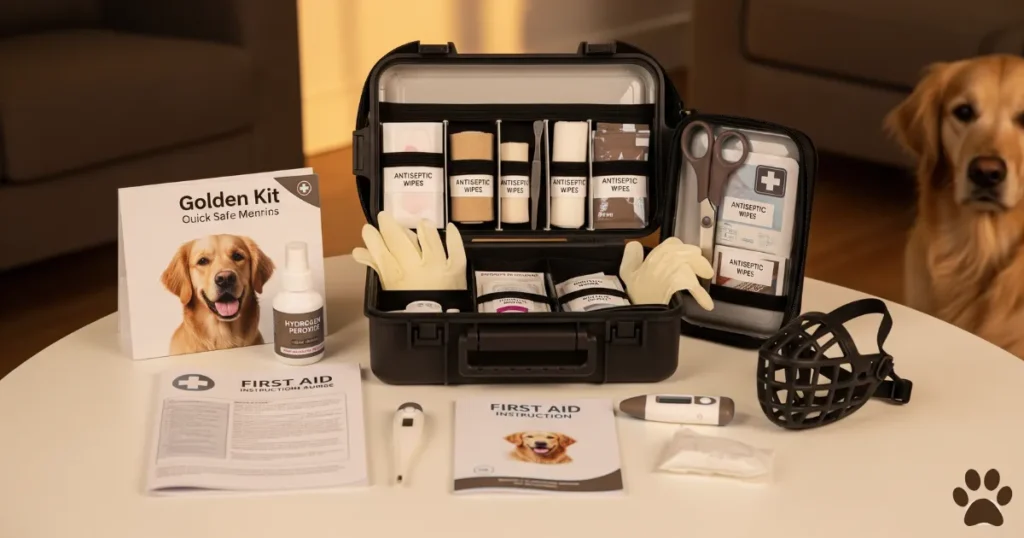
Essential Items in a Dog First Aid Kit
A complete dog first aid kit should always be kept at home and can be easily taken with you on a trip. Essential items include:
Sterile gauze pads and pads:
for bandaging and stopping bleeding.
Adhesive tape:
For holding bandages in place.
Wet wipes or antiseptic solution (vet approved):
For treating minor wounds.
Blunt-tipped scissors:
For safely trimming hair or bandaging.
Tweezers:
For removing splinters and ticks.
Digital rectal thermometer and lubricant:
For taking your dog’s temperature (normal temperatures are between 100.5 and 103.5°F).
Petroleum jelly:
For lubricating the thermometer.
Eye wash solution (vet-approved):
To remove irritants from the eyes.
Hydrogen peroxide (3% solution):
To induce vomiting as directed by your vet (use only under vet supervision).
Activated charcoal:
To absorb certain toxins as directed by your vet.
Muzzle:
To safely handle a dog that is in pain and may bite (make sure the muzzle fits well and your dog is accustomed to it).
Emergency blanket:
To help maintain body temperature.
Basic First Aid for Minor Injuries
If you know the basics of first aid, you can stabilize your Golden Retriever until you can get him to the vet:
Minor cuts and scrapes:
Clean the wound gently with antiseptic wipes and apply a sterile bandage if needed.
Bleeding:
Apply clean gauze to the bruise and apply pressure until the bleeding stops.
Sprains and strains:
Limit movement and avoid putting too much stress on the injured limb.
Burns:
For minor burns, apply cool (not ice cold) water to the affected area.
Choking:
If your dog is choking and conscious, try the Heimlich maneuver for dogs (there are different techniques depending on the size of the dog). If unconscious, open the airway and check for blockages.
Heatstroke:
Take your dog to a cool place, give him some cold water, and put cold, wet towels on his body (avoid ice water).
When to Call the Vet
While minor injuries can be treated at home, some situations require immediate veterinary care. Seek immediate medical attention if your Golden Retriever shows any of the following symptoms:
• Trouble breathing or choking.
• Severe bleeding that does not stop.
• Unconsciousness.
• Attack.
• Signs of severe pain (whining, restlessness, inability to lie down comfortably).
• Possibly poisoned.
• Severe vomiting or diarrhea.
• Suddenly lost the ability to walk or move.
• Bloated or swollen abdomen.
Creating a Safe Home Environment for Your Golden Retriever
Our homes should be a sanctuary. And we can’t extend that sentiment more sincerely to our beloved golden retrievers. With their natural curiosity and boundless energy, these wonderful dogs can unintentionally get into dangerous situations if our living spaces aren’t designed with them in mind. Creating a safe, risk-free environment is crucial to responsible pet ownership. It greatly reduces the risk of accidents and gives your golden retriever space to explore and relax without exposing them to unnecessary danger.
How to Dog-Proof Your Home: A Proactive Approach to Damage Prevention
Dog-proofing your home is like baby-proofing your home, take conscious steps to eliminate potential hazards in your home. Important precautions include:
Safe storage of hazardous materials:
All cleaning products, medications (for humans and dogs), and potentially toxic materials should be stored in securely locked cabinets or on high shelves out of your Golden Retriever’s reach.
Handling power cords:
Store power cords carefully, bundle hem together, or use protective devices to prevent them from being chewed undetected, which can cause an electric shock.
Safe disposal:
Use trash cans with secure lids to prevent your dog from reaching and swallowing potentially dangerous items.
Small item storage:
Items such as coins, buttons, jewelry, and rubber bands can pose a serious choking hazard or cause internal blockages if swallowed.
Window and balcony precautions:
Make sure screens are securely fastened, and always supervise your Golden Retriever on balconies or elevated areas to avoid falls.
Be careful when placing houseplants:
Many common houseplants are poisonous to dogs. Identify these plants and remove them. You can also place them in a place where your furry friend cannot reach them.
Recognizing Common Household Hazards for Golden Retrievers
Golden Retrievers, especially puppies and adolescents, often explore their surroundings using their mouths.
Foods Toxic to Dogs:
Chocolate, onions, garlic, grapes, raisins, xylitol (found in many sugar-free products), and alcoholic beverages are Toxic Foods for dogs.
Cleaning Products:
Even small amounts can cause serious internal damage if swallowed.
Medications:
Both prescription and over-the-counter medications can be harmful or even fatal to dogs.
Toys and Small Objects:
These can be easily swallowed, causing choking or intestinal obstruction.
Create Safe Outdoor Areas for Exercise and Play
Your garden should also be a safe and comfortable place for your Golden Retriever to be active:
Secure Fencing:
Make sure your yard is completely enclosed with a strong fence to prevent leaks and protect your dog from traffic and other outdoor hazards. Check the seal regularly for damage and weak spots.
Remove Toxic Plants and Chemicals:
Be careful with plants in your garden that are toxic to dogs. Avoid using pesticides and fertilizers that can be harmful.
Provide Shade and Water:
Especially in hot weather, make sure your dog always has access to a shady spot and fresh water outside.
Supervised Outdoor Activities:
Even in a fenced yard, it is important to supervise your Golden Retriever’s play. This way, you can keep your child away from unexpected dangers and trouble.
Adventure Awaits: Travel Safely and Comfortably with Your Golden Retriever
The idea of exploring new horizons with your Golden Retriever is simply exciting! However, careful planning and preparation are necessary to ensure your safety and comfort during the trip. Whether you are traveling by car or plane, putting your furry friend’s well-being first will make the trip more enjoyable for everyone.
Tips for Traveling Safely and Comfortably with Your Dog
Place your Golden Retriever in a well-ventilated crate or put them on a harness in the car. Never let them out. Stop regularly to go to the bathroom, exercise, and drink water. Keep the car well-ventilated and at a comfortable temperature. If you are traveling by plane, check the airline’s pet policy in advance and consider the potential stress on your dog.
Important Things to Pack for Traveling with Your Dog
Just like you would pack your luggage, your Golden Retriever will need some basic travel essentials: food and water bowls, his own food, plenty of fresh water, a leash and collar with tag, any medications he needs, his usual bed or blanket, his favorite toys, poop bags, and a vaccination record. A pet first aid kit is also highly recommended.
Handling with Stress and Anxiety While Traveling
Traveling can be stressful for some dogs. Get your Golden Retriever used to the carrier or harness well before the trip. Pack items that are familiar to you and that bring you comfort. Consider using calming aids like pheromone spray or calming treats (check with your vet first). Talk to your dog in a soothing voice and stay calm. For anxious travelers, your veterinarian may recommend pre-trip anti-anxiety medications. By taking these precautions, you can ensure that your Golden Retriever is a happy, calm travel companion who will enjoy the adventures with you.

Conclusion:
Caring for a Golden Retriever is a rewarding experience. Taking care of your own health is key to a long and happy life together. From establishing a daily routine and providing proper nutrition to being vigilant about preventative measures and recognizing early signs of illness, every effort you make contributes to your well-being. Note that mental stimulation, creating a safe environment, and preparing for travel and unexpected situations are important. A proactive approach to your Golden Retriever’s health and regular checkups with your veterinarian are the most effective ways to ensure that your Golden Retriever lives a healthy and vibrant life by your side for many years to come. By following these important health tips, you’re not just caring for a pet; you’re caring for a beloved family member and investing in a life full of happy family moments and golden moments. Follow us for more Essential Health Tips for Golden Retrievers.
Dr. Nabeel A.
Hi, I’m Dr. Nabeel Akram – a farm management professional by trade and a passionate Golden Retriever enthusiast at heart. With years of experience in animal science and livestock care, I’ve built a career around understanding animals—how they live, thrive, and bring value to our lives. This blog is a personal project born from that same passion, focusing on one of the most loyal and lovable breeds out there: the Golden Retriever. Whether I’m managing farm operations or sharing insights on canine health, behavior, and care, it all ties back to one core belief—animals deserve thoughtful, informed, and compassionate attention. Welcome to a space where professional expertise meets genuine love for dogs.
Facebook |
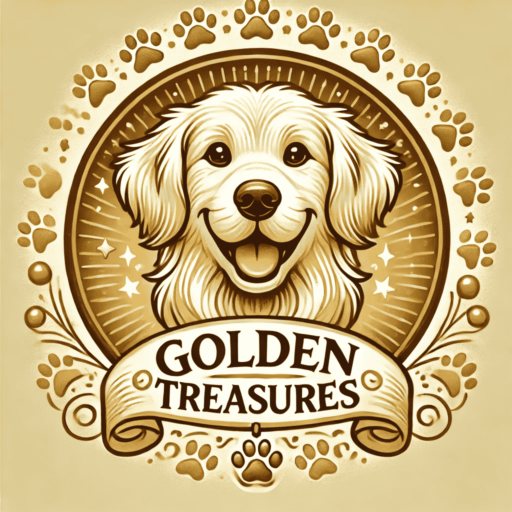
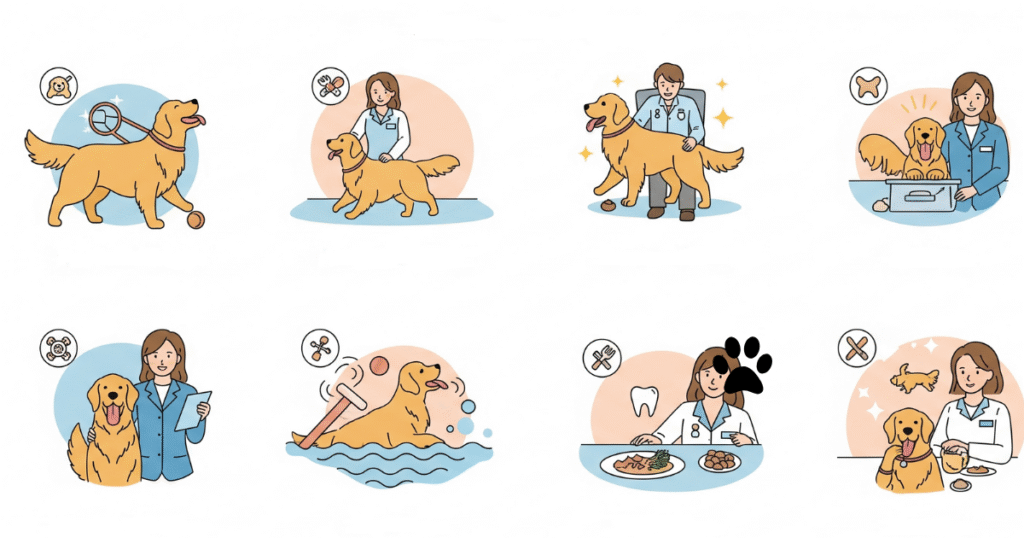
Links will be automatically removed from comments.